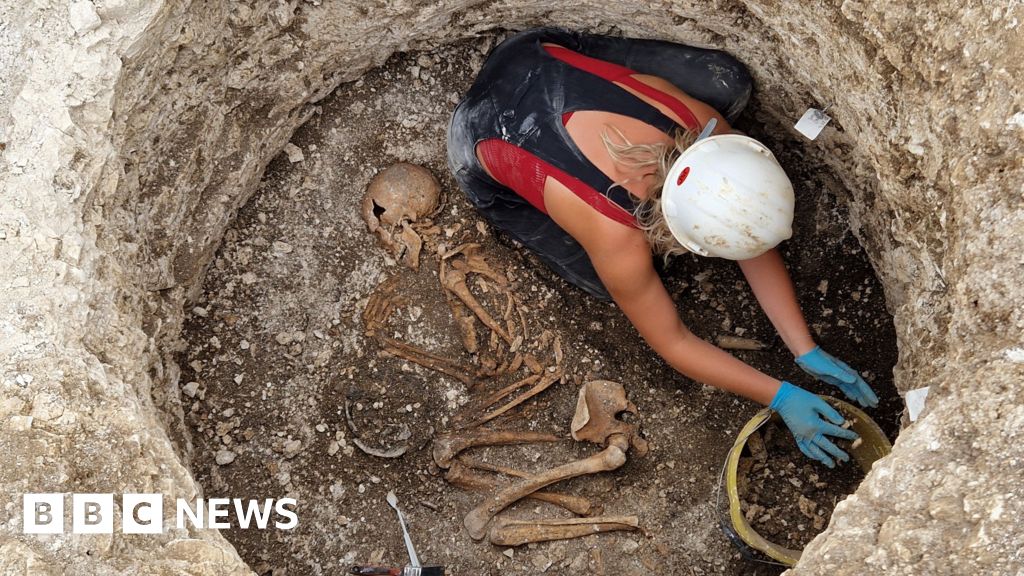ARTICLE AD BOX
By Ben Price
BBC News
 Image source, Getty Images
Image source, Getty Images
There are hopes the now empty mines could be used to tackle the energy crisis
Wales' disused coal mines could get a new lease of life as a green energy source to heat homes.
Investigations will be carried out to find the best spots to pump naturally heated water from underground to communities.
The Welsh government is spending £450,000 on the project which it hopes will help cut energy bills and Wales' carbon footprint.
When Wales' pits closed, the pumps were switched off and the mines flooded.
Now ministers hope that the water, which is naturally heated underground, can be used to help Wales become carbon neutral by 2050.
The Coal Authority's Gareth Farr said water would be extracted from the disused mines and put through a heat exchanger, where some heat is recovered, before it is amplified by a heat pump.
"Then the heat is pumped around a heat network to homes, businesses and all parts of the local community and the water is returned underground," he said.
The Coal Authority will spend the cash on feasibility studies to map where heat can be taken from water in disused mines and used to benefit communities by heating homes, schools and businesses.
Mr Farr said: "Each mine water heat scheme will be bespoke, but the ultimate end game will be that consumers won't be paying any more than they currently are for their heating and hopefully they will eventually be paying significantly less."
He said to get to the water bore holes often had to be drilled. Once complete, they are then hidden beneath the ground with pipes for the water and heat network.
The Coal Authority's Gareth Farr said each mine water heat scheme would be bespoke
Gas currently heats most Welsh homes. But by 2025 newly built houses will not be connected to the gas mains.
Wales' climate change minister, Julie James, said: "It's very exciting that communities could be metres from a technology-ready alternative to traditional heating methods."
In Gateshead, England, a £9m programme has become the largest mine water heat scheme in the UK.
It will provide as much as half of the required heat to buildings on the network including homes, businesses and public buildings.
What is already happening?
In Wales there have been stumbling blocks.
Plans for a mine water scheme in Caerau, Bridgend county, stopped in recent months despite a feasibility study concluding it was achievable.
Bridgend council said it provided valuable information but that the scheme would have been too expensive.
A spokesman said: "The council and its partners agreed to consider alternative options, and to develop and submit a re-profiled programme to the Wales European Funding Office instead."
A similar scheme in Taff's Well, Rhondda Cynon Taf, has seen water from a thermal spring used to heat the primary school and pavilion.
Rhondda Cynon Taf council's Christina Leyshon said the new technology could bring cheaper energy to communities
Water is pumped from the spring at about 21C to a nearby heat exchanger.
The heat then goes to pumps in the pavilion. Underground pipes also carry heat to the school across the road.
Rhondda Cynon Taf council's climate change cabinet member, Christina Leyshon, said: "This technology could also be used in the coal mines of south Wales which are just below our feet and potentially bring cheaper energy to our communities and energy that lasts for the long term as well.
"These are long term projects and we have to look to the future. The main thing is that we can reduce our carbon footprint here in RCT and throughout Wales."
A warm water spring at Taff's Well has been used to heat a school and pavilion
Ms James said she believed making homes more energy efficiency was essential in dealing with climate change.
She said: "We need to think innovatively and ensure we meet out renewable energy needs of the future, so I'm looking forward to hearing what the Coal Authority discover as part of their work."

 2 years ago
65
2 years ago
65








 English (US) ·
English (US) ·